Consumer confidence ticks slightly upward
Washington, DC, February 4, 2021 — Consumer confidence indexes at 51.9 in this week’s Ipsos-Forbes Advisor U.S. Consumer Confidence Tracker, an increase of 1 point from the week before.
Gains in overall sentiment are driven primarily by a rise in job confidence, which increased 2.3 points from the week prior and now reports a reading of 57.5. The improvement in jobs sentiment corresponds with a drop in the percentage of Americans who report that they, a family member, or close acquaintance lost their job in the past six months.
This week, Jobs Confidence in the Northeast is at 62.0, its highest level since the beginning of the pandemic, up 3.8 points from last week and 8.7 points higher than the overall Job Confidence pandemic average. The same pattern appears among Americans living in urban areas (as opposed to suburban or rural areas): at 58.9, Jobs confidence in urban areas is 5.8 points higher than last week and more than 8 points higher than its pandemic average.
Read the full story from Forbes Advisor here.
Learn more about the Ipsos Global Consumer Confidence Index and sub-indices via the interactive portal, Ipsos Consolidated Economic Indicators (IpsosGlobalIndicators.com) including graphic comparisons, trended data and all the questions on which they are based.
Detailed Findings
1. Scoring at 51.9, the latest overall Consumer Confidence rose 1 point from last week.
- The Consumer Confidence index is currently 2.1 points above the pandemic average and 8.2 points lower than where it stood in early March (60.1).
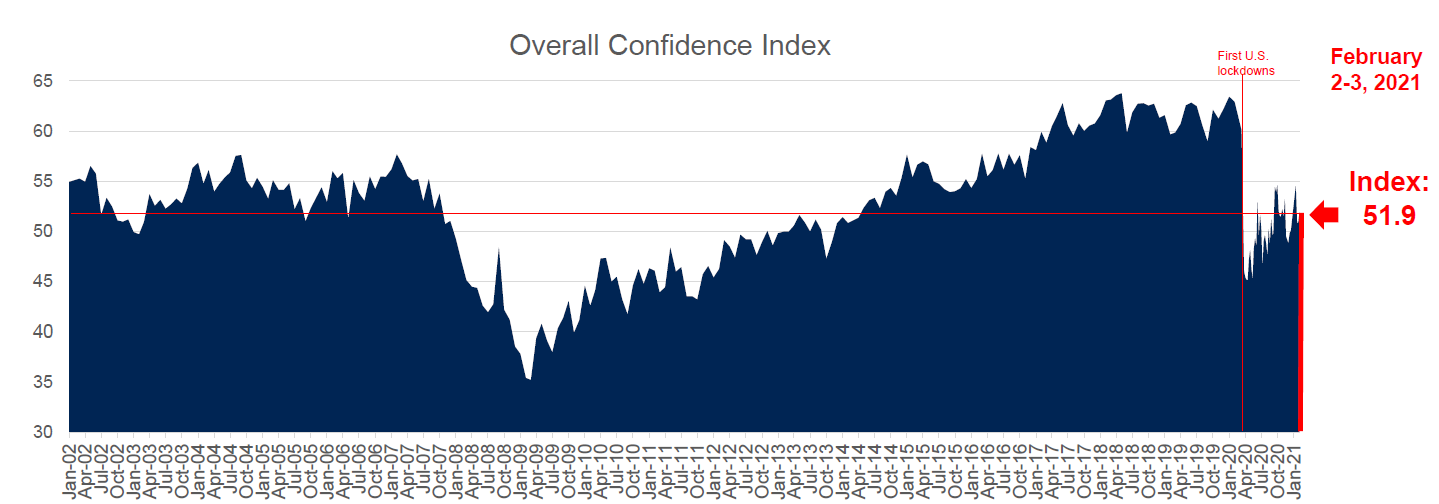
2. The Current, Expectations and Investment sub-indices posted small gains of less than 1 point each.
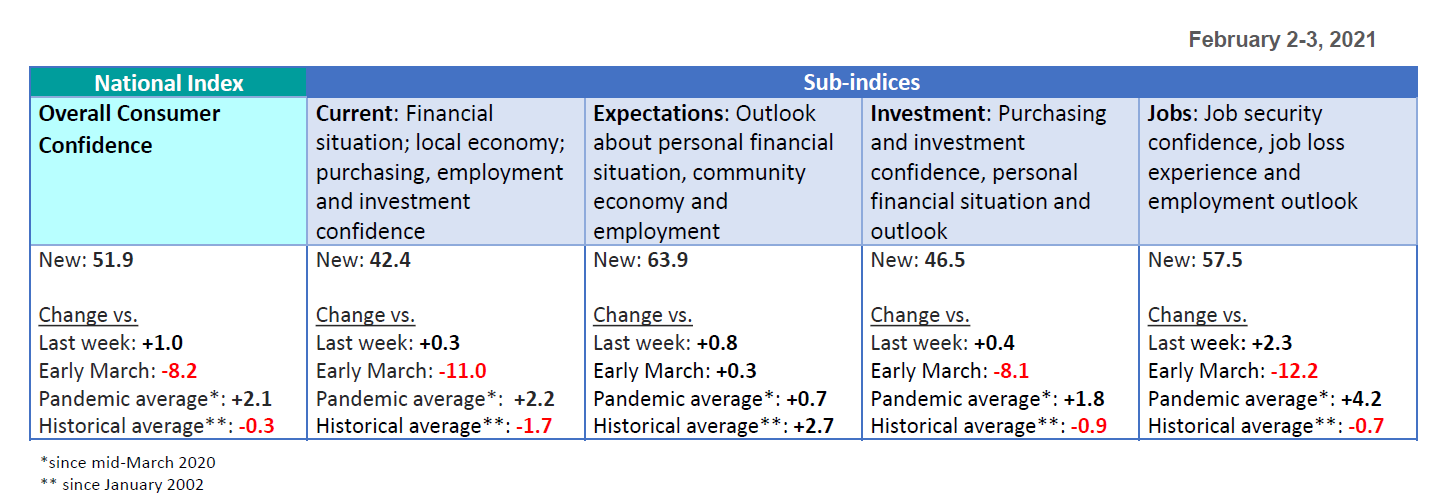
3. Jobs confidence gained 2.3 points from the week prior, as the number of Americans filing first-time jobless claims fell below 800,000.
- The proportion of Americans reporting they, a family member, or a personal acquaintance lost their job in the past six months due to economic conditions is at 39%, down 4 points from last week.
- In addition, 48% say it’s likely they, a family member or a personal acquaintance will lose their job in the next six months due to economic conditions, down 1 point from last week.
4. Fewer Americans this week believe that the economy will pick up quickly once pandemic restrictions are relaxed. The percentage who agree fell 5 points from last week to 51% now.
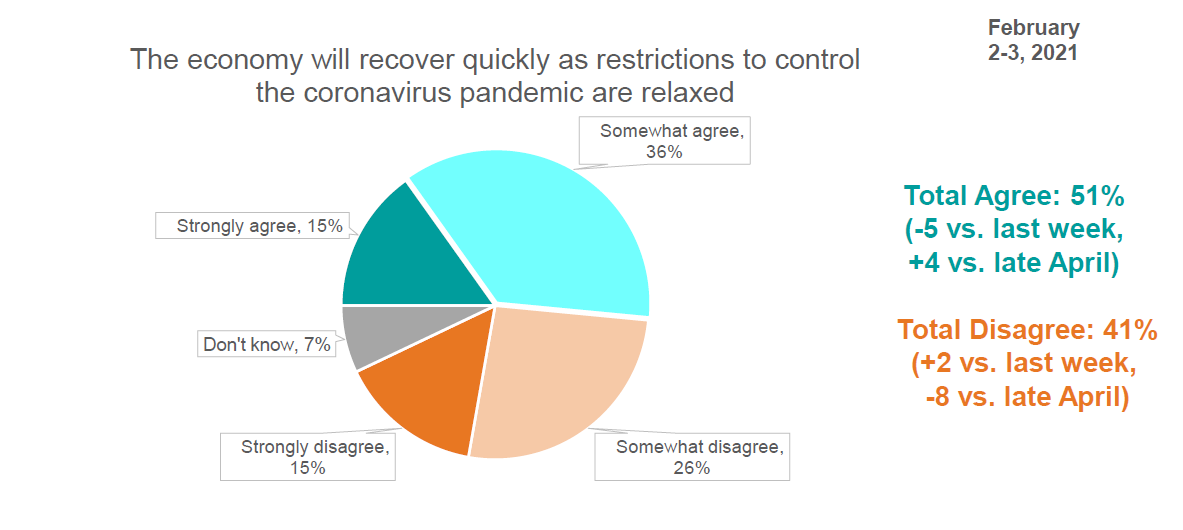
5. Americans remain divided on the question of whether to allow businesses to resume activity even if the virus is still not fully contained. Half of Americans (51%) believe that economic activity should be allowed to resume, while a large minority (44%) disagree.
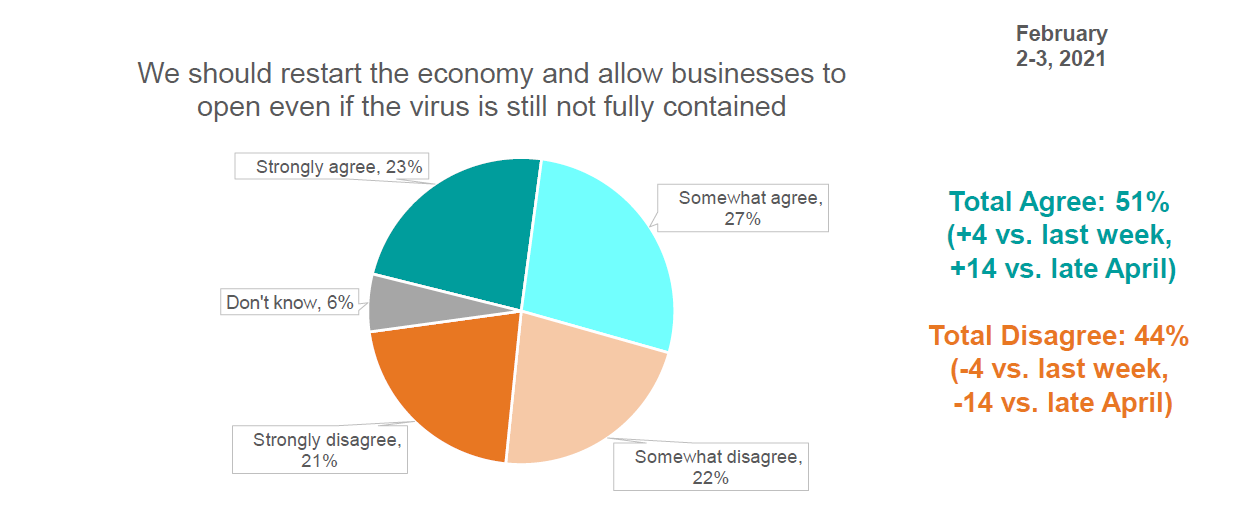
6. Purchasing confidence for both major items and other household items is still weak relative to the more confident readings of early to mid-January.
- Compared to six months ago, 36% say they are more comfortable making a major purchase like a home or a car, down 1 point from last week and down 8 points from the first week of January.

- Compared to six months ago, 43% say they are more comfortable making other household purchases than they were six months ago, unchanged from last week but down 4 points from the first week of January
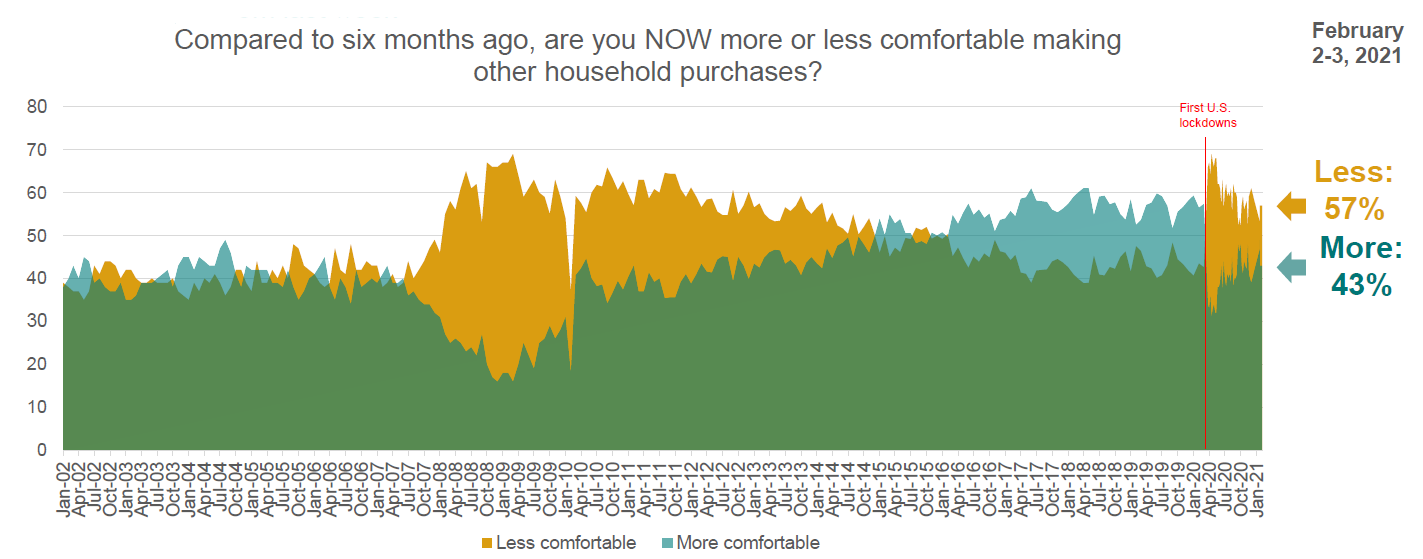
Questions
The data used for the Consumer Confidence index and sub-indices is based on the following questions:
- Now, thinking about our economic situation, how would you describe the current economic situation in US? Is it… very good, somewhat good, somewhat bad or very bad?
- Rate the current state of the economy in your local area using a scale from 1 to 7, where 7 means a very strong economy today and 1 means a very weak economy.
- Looking ahead six months from now, do you expect the economy in your local area to be much stronger, somewhat stronger, about the same, somewhat weaker, or much weaker than it is now?
- Rate your current financial situation, using a scale from 1 to 7, where 7 means your personal financial situation is very strong today and 1 means it is very weak
- Looking ahead six months from now, do you expect your personal financial situation to be much stronger, somewhat stronger, about the same, somewhat weaker, or much weaker than it is now?
- Compared to 6 months ago, are you NOW more or less comfortable making a major purchase, like a home or car?
- Compared to 6 months ago, are you NOW more or less comfortable making other household purchases?
- Compared to 6 months ago, are you NOW more or less confident about job security for yourself, your family and other people you know personally?
- Compared to 6 months ago, are you NOW more or less confident of your ability to invest in the future, including your ability to save money for your retirement or your children’s education?
- Thinking of the last 6 months, have you, someone in your family or someone else you know personally lost their job as a result of economic conditions?
- Now look ahead at the next six months. How likely is it that you, someone in your family or someone else you know personally will lose their job in the next six months as a result of economic conditions?
Additional questions
Q. To what extent do you agree with the each of the following
- The economy will recover quickly once the restrictions to control the coronavirus pandemic are relaxed.
- We should restart the economy and allow businesses to open even if the virus is still not fully contained.
About the Study
These findings are based on data from an Ipsos survey conducted February 2-3, 2021 with a sample of 953 adults aged 18-74 from the continental U.S., Alaska and Hawaii who were interviewed online in English.
The sample was randomly drawn from Ipsos’ online panel, partner online panel sources, and “river” sampling and does not rely on a population frame in the traditional sense. Ipsos uses fixed sample targets, unique to each study, in drawing a sample. After a sample has been obtained from the Ipsos panel, Ipsos calibrates respondent characteristics to be representative of the U.S. Population using standard procedures such as raking-ratio adjustments. The source of these population targets is U.S. Census 2016 American Community Survey data. The sample drawn for this study reflects fixed sample targets on demographics. Post-hoc weights were made to the population characteristics on gender, age, race/ethnicity, region, and education.
Statistical margins of error are not applicable to online non-probability polls. All sample surveys and polls may be subject to other sources of error, including, but not limited to coverage error and measurement error. Where figures do not sum to 100, this is due to the effects of rounding. The precision of Ipsos online polls is measured using a credibility interval. In this case, the poll has a credibility interval of plus or minus 3.6 percentage points for all respondents. Ipsos calculates a design effect (DEFF) for each study based on the variation of the weights, following the formula of Kish (1965). This study had a credibility interval adjusted for design effect of the following (n=953, DEFF=1.5, adjusted Confidence Interval=+/-5.1 percentage points).
Findings from previous time periods going back to March 2011 are based on data from Refinitiv /Ipsos’ Primary Consumer Sentiment Index (PCSI) collected in a monthly survey on Ipsos’ Global Advisor online survey platform with the same questions. For the PCSI survey, Ipsos interviews a total of 1,000+ U.S. adults aged 18-74. The Refinitiv/Ipsos Primary Consumer Sentiment Index (PCSI), ongoing since 2010, is a monthly survey of consumer attitudes on the current and future state of local economies, personal finance situations, savings and confidence to make large investments. The PCSI metrics reported each month consist of a “Primary Index” based on 10 questions available upon request and of several “sub-indices” each based on a subset of these 10 questions. Those sub-indices include a Current Index, an Expectations Index, an Investment Index and a Jobs Index.
Findings for January 2002- February 2011 are based on data from the RBC CASH Index, a monthly telephone survey of 1,000 U.S. adults aged 18 and older conducted by Ipsos with a margin of error of +/- 3.1 percentage points.
For more information on this news release, please contact:
Chris Jackson
Senior Vice President, U.S., Public Affairs
Ipsos
+1 202 420 2025
[email protected]
Kate Silverstein
Media Relations Specialist, U.S., Public Affairs
Ipsos
+1 718 755-8829
[email protected]
For more information on COVID-19 please click here
About Ipsos
Ipsos is the world’s third largest market research company, present in 90 markets and employing more than 18,000 people.
Our passionately curious research professionals, analysts and scientists have built unique multi-specialist capabilities that provide true understanding and powerful insights into the actions, opinions and motivations of citizens, consumers, patients, customers or employees. We serve more than 5000 clients across the world with 75 business solutions.
Founded in France in 1975, Ipsos is listed on the Euronext Paris since July 1st, 1999. The company is part of the SBF 120 and the Mid-60 index and is eligible for the Deferred Settlement Service (SRD).
ISIN code FR0000073298, Reuters ISOS.PA, Bloomberg IPS:FP www.ipsos.com


